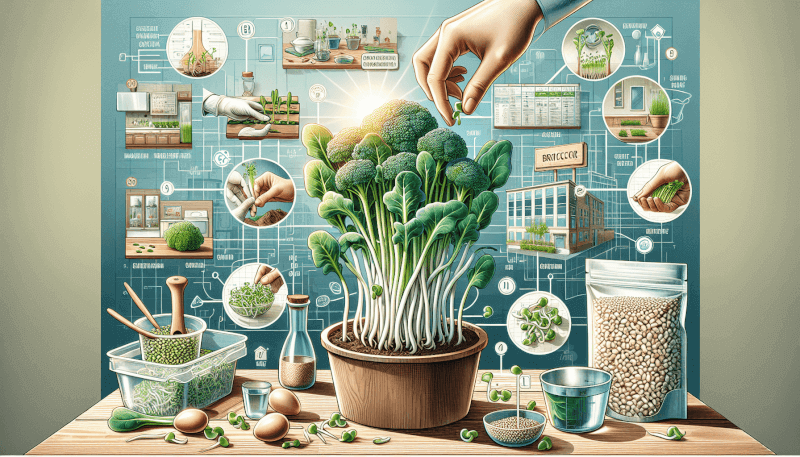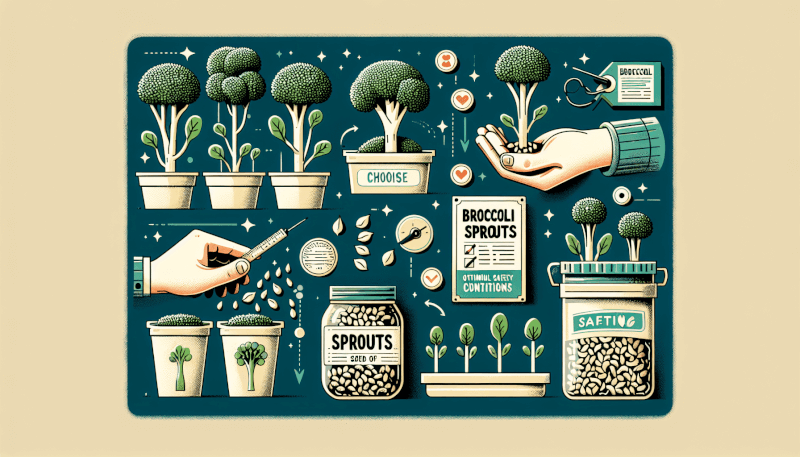👋 Click the mic button to talk to Alfred, the Todd's Seeds Gardening/Sprouting Expert – Feel free to ask him anything!
Ask Virtual Todd Anything - Click the Mic
Are you ready to embark on a journey of delicious and nutritious homegrown broccoli sprouts? Look no further, because this article will guide you through the process of growing broccoli sprouts safely. From selecting the right seeds to creating the perfect growing environment, you’ll learn all the tips and tricks to ensure successful cultivation. Get ready to enjoy the satisfying crunch and health benefits of these tiny powerhouses in your salads, sandwiches, and more. Let’s get started!
Selecting Seeds
When it comes to growing broccoli sprouts, it is crucial to start with high-quality seeds. Opt for organic broccoli seeds as they are free from harmful pesticides and chemicals, ensuring that your sprouts are healthy and safe to consume. Additionally, choose seeds from reputable suppliers who specialize in providing reliable and quality sprouting seeds. This way, you can be confident that you are starting your sprouting journey with the best possible seeds.
Preparing the Sprouting Equipment
Before you begin the sprouting process, gather the necessary sprouting containers. These containers can range from mason jars to specialized sprouting trays or containers. Ensure that the containers are clean and sanitized to prevent any potential contamination. A thorough rinse with hot soapy water followed by a sanitizing solution, such as hydrogen peroxide or vinegar, will help ensure a sterile environment for your sprouts. Additionally, it is advisable to obtain a sprouting lid or mesh that allows for proper drainage while keeping the sprouts contained.

Soaking the Seeds
To initiate the sprouting process, measure the desired amount of broccoli seeds according to your needs. It is recommended to start with a small quantity, especially if you are new to sprouting, to avoid wastage. Before soaking, rinse the seeds thoroughly under running water to remove any dirt or debris. Once rinsed, place the seeds in a clean container and cover them with clean water. Allow the seeds to soak for about 8-12 hours or overnight. This soaking period helps to activate the germination process and prepares the seeds for sprouting.
Rinsing and Draining
After soaking the seeds, it is crucial to rinse them twice a day to ensure optimal growth and prevent the growth of harmful bacteria. Gently drain the water from the soaked seeds and rinse them thoroughly under running water. Use your hands to agitate the seeds, ensuring that all surfaces are cleansed. Once rinsed, drain the excess water completely to avoid water accumulation, which can lead to mold or bacterial growth. Proper drainage is crucial for the healthy development of your sprouts.

Providing Optimal Growing Conditions
To promote the healthy growth of your broccoli sprouts, it is essential to provide them with optimal growing conditions. Place your sprouts in a well-lit area that receives indirect sunlight. Avoid placing them in direct sunlight as it may cause excessive heat, which can damage the sprouts. Maintain a consistent temperature and humidity level in the sprouting area. Broccoli sprouts thrive in temperatures between 60-70°F (15-21°C). Additionally, proper ventilation is crucial to prevent the buildup of condensation and maintain a fresh environment for the sprouts.
Preventing Contamination
To ensure the safety of your broccoli sprouts, it is important to maintain a clean growing area. Regularly clean and sanitize the sprouting containers, lids, and other equipment used in the sprouting process. Avoid contact with harmful substances such as chemicals, pesticides, or even pet dander that can potentially contaminate the sprouts. Monitor the sprouts for any signs of mold or bacterial growth, such as foul odors or unusual discoloration. If you notice any signs of contamination, discard the sprouts and start fresh to prevent any potential health risks.
Harvesting and Storing
Once your broccoli sprouts have developed two leaves, they are ready to be harvested. It usually takes around 4-6 days for the sprouts to reach this stage, but the timing may vary depending on the growing conditions. Using clean scissors or a sharp knife, cut the sprouts just above the roots, leaving a small portion intact for future growth. Store the harvested sprouts properly to maintain their freshness and quality. Place them in a clean, airtight container or a sealed plastic bag and refrigerate them. Proper storage will help maximize their shelf life and retain their nutrient content.
Recognizing Potential Hazards
While growing broccoli sprouts can offer numerous health benefits, it is important to understand the potential hazards associated with sprouting. Raw sprouts, including broccoli sprouts, carry a risk of bacterial contamination such as E. coli and Salmonella. It is crucial to handle and consume sprouts with caution, especially for individuals with weakened immune systems, pregnant women, and young children. It is advisable to follow safety guidelines provided by health authorities to minimize the risk of foodborne illnesses.
Common Problems and Troubleshooting
Growing broccoli sprouts may encounter some common problems. Yellowing or wilting sprouts can indicate issues with watering, temperature, or insufficient airflow. Adjusting these factors accordingly and ensuring proper drainage can help alleviate these problems. Mold or fungal growth is another issue that can arise due to excessive moisture. If mold develops on the sprouts, it is best to discard them and thoroughly clean the sprouting equipment. Unpleasant odors can be a sign of bacterial growth, indicating contamination. In such cases, it is advisable to start anew with fresh seeds and maintain a clean growing environment.
Health Benefits of Broccoli Sprouts
Broccoli sprouts pack a powerful nutritional punch, making them a valuable addition to any diet. They are rich in essential vitamins and minerals, including vitamin C, vitamin K, folate, and potassium. These nutrients contribute to overall well-being and support various bodily functions. Broccoli sprouts are also high in antioxidants, which help protect against cellular damage caused by harmful free radicals. Furthermore, studies suggest that broccoli sprouts may have anti-cancer properties due to their high content of a compound called sulforaphane. Incorporating broccoli sprouts into your diet can potentially enhance your overall health and well-being.
Growing broccoli sprouts is an enjoyable and rewarding process that allows you to have a fresh supply of nutrient-dense sprouts right at your fingertips. By following these guidelines and taking necessary precautions, you can ensure the safe and successful growth of your broccoli sprouts. Remember to prioritize cleanliness, monitor for any signs of contamination, and enjoy the numerous health benefits that broccoli sprouts have to offer. Happy sprouting!